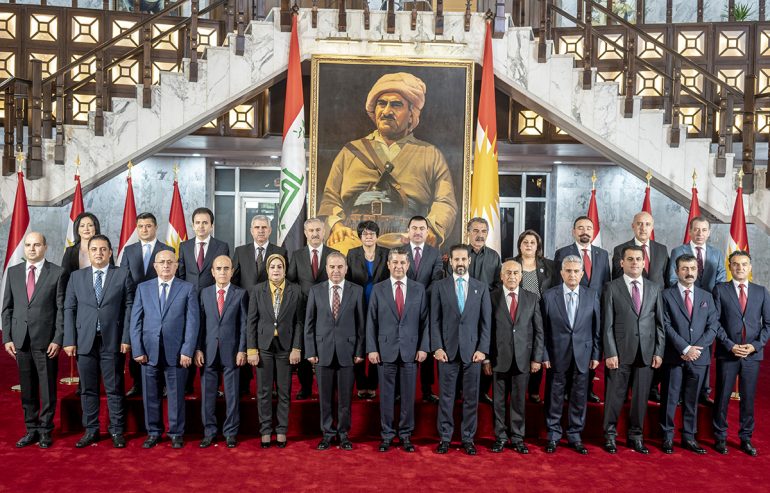On Monday, following a half-year hiatus from Kurdistan Regional Government (KRG) meetings due to tense relations between Kurdistan’s two main parties, Prime Minister Masrour Barzani and his deputy, Qubad Talabani, had an unexpected meeting.
The KRG released a statement indicating that “both sides discussed the financial and administrative challenges facing the KRG, agreeing on the importance of dialogue in resolving the issues with the support of all ministerial factions within the cabinet.”
The statement further noted that they “discussed the latest developments in Kurdistan and the region, emphasizing the importance of unity to safeguard the constitutional rights of the people of Kurdistan.”
Deputy Prime Minister Qubad Talabani expressed on Twitter, “United, we believe we can overcome our challenges, strive to better serve our citizens, and stay resilient amidst the many threats facing the Kurdistan Region.”
The return of PUK ministers to the cabinet indicates progress in addressing long-standing issues between the PUK and KDP. Agenda items include revising election laws, managing the Kurdistan Region’s revenue sharing, decision-making powers within the KRG, and the case of Hawkar Jaff’s killing in Erbil. Jaff, who switched allegiance from the Sulaymaniyah-based Zanyari Agency (PUK Intelligence Services) to the Erbil-based Zanyari Agency, became a casualty of a power struggle.
The PUK’s primary concern, reflected in advocating for amending the election law, is their perceived marginalization by the KDP in governing the region.
The PUK intends to amend the election law to reestablish a balance of power with their rival coalition partner, KDP. Despite both parties being part of the KRG, the KDP holds the presidency and dominates the cabinet. The PUK theoretically leads parliament via Speaker Rewaz Faeq, but the KDP’s astute legislative engineering has diminished her power: The speakership also includes a deputy and a secretary. The deputy is the KDP’s Hemin Hawrami. The secretary is Muna Kahveci, a Turkmen politician allied to the KDP. The pair can outvote Faeq, ostensibly their boss, on parliamentary process.
By advocating for electoral reform, the PUK aims to secure a more equitable balance of power in the Kurdistan Region moving forward. This may prove a struggle if polling and electoral headwinds are anything to go by. No matter the voting system, the PUK faces an uphill battle to even maintain its position vis-à-vis the KDP.
International forces including the US and UK also shared their perspectives on the meeting. US Assistant Secretary of State for Near Eastern Affairs Barbara A. Leaf, who is largely credited for mediating between two sides following a recent visit to Iraq and the Kurdistan Region, hailed the meeting as a “great move.” The US ambassador to Iraq also praised the leadership of the Prime Minister and his deputy in resolving issues through dialogue. UK Consul General in Erbil Rosy Cave expressed her pleasure and emphasized that a united KRG was in the best interest of the Kurdistan Region’s citizens. She added that she hopes this marks the beginning of a reconciliation and collaboration process.
After the meeting, the PUK’s return to KRG cabinet meetings seems imminent. PUK politburo member Saadi Ahmed Pira confirmed to reporters that his party’s ministerial team will resume attending the weekly cabinet sessions.
While the initial discussions between the Prime Minister and his deputy, coupled with rumors of a PUK minister participating in cabinet meetings or talking to KDP cabinet officials are encouraging, actual policy implementation is crucial for a functional KRG that includes all participants and coalition partners. The PUK’s return to the KRG cabinet meetings doesn’t necessarily mean all their conditions have been met, but it could indicate there’s been some flexibility in addressing the issues in more depth, following US mediation efforts.
Qubad Talabani has faced criticism from members of his own party for showing too much flexibility towards the KDP during his tenure as Deputy Prime Minister, but it appears his patience has worn thin. Despite having a solid working relationship with the previous Prime Minister and current President Nechirvan Barzani, he couldn’t replicate this rapport with incumbent Prime Minister Masrour Barzani. Masrour, accused of leading the government like a security service, appointed several assistants upon taking office to effectively handle the Deputy Prime Minister’s duties (along with other PUK ministers). This move is an example of how the Deputy Prime Minister’s powers have been curtailed during his tenure.
The PUK’s impending return to KRG cabinet meetings, likely facilitated by the US, brings hope of potential agreements in the pipeline. The prospects of scheduled elections being held this year remain in flux, but they’re definitely more feasible than this time last week.


